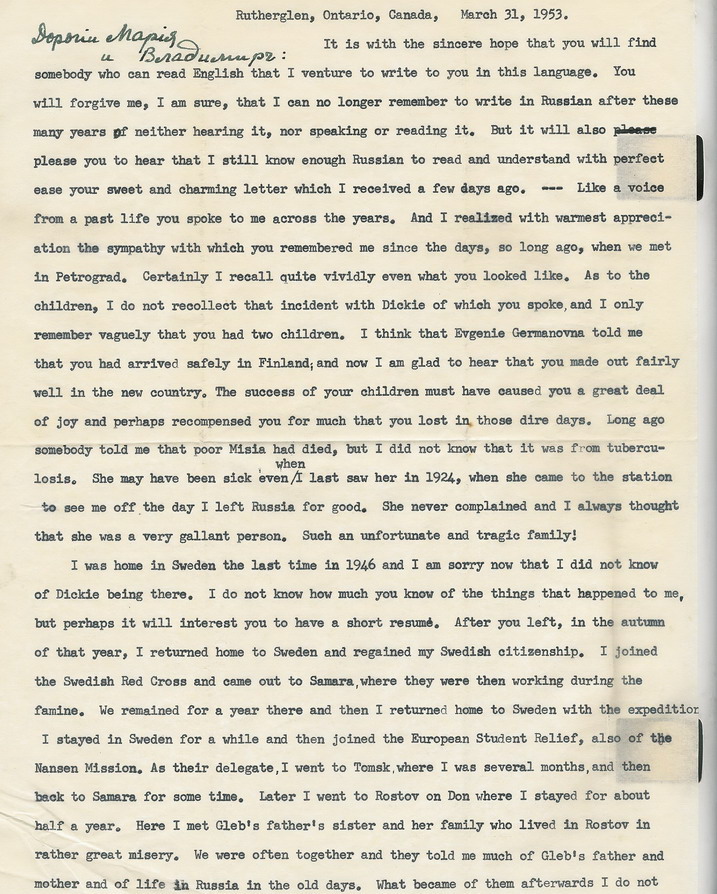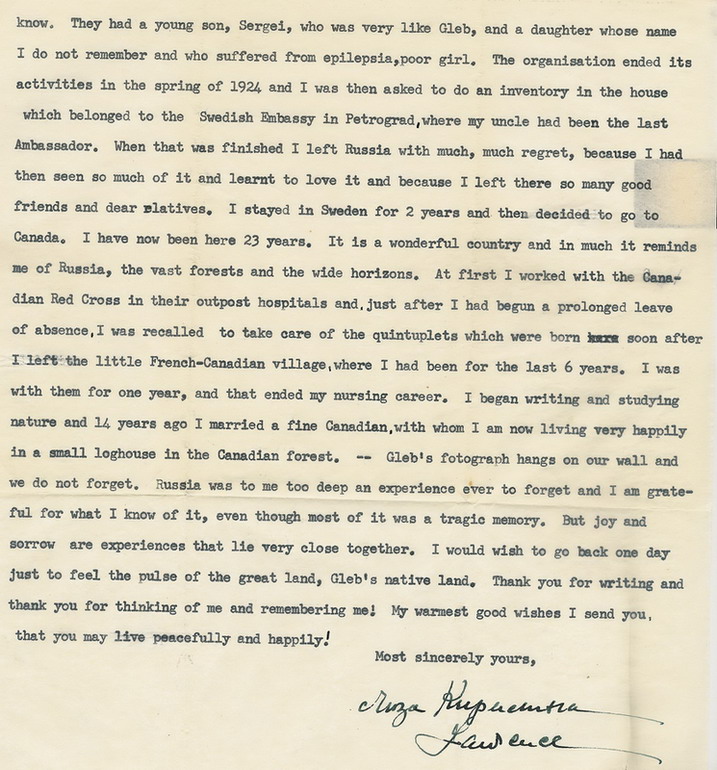| I. V. Korzun's Memoirs |
|||
| Russian | The letter of Vladimir and Maria Kinert to Louise Flach - Kiriline , 1952 Dear Lisa, More than 34 have passed since our last meeting, and now when our son currently residing in Sweden found your mother and even talked to her on the phone, learned your address and [other things] about you, we have decided to write you this letter. First and foremost: maybe, in those turbulent times you did not have a chance to know whether we had managed to escape as we wanted, although for this we are indebted to you. Eugenia Germanovna, on her part, did what she could, and in the night of January 1st, 1922 we came to Finland. So, we have saved our children from the defiling influence of Bolshevism, the environment, school and Komsomol, and at the same time saved ourselves (because people like us should have inevitably perished there sooner or later) mainly owing to you, and we will never forget this. Here in Finland in the beginning everything seemed a Paradise, the main thing being freedom and wonderful attitude from everyone around us. Then long years of work started, because life in our small estate in the Vyborg province where my mother and aunt were also living at the time was financially impossible. We moved to the eastern shore of the Ladoga Lake, to Pitkaranta, to a big paper pulp plant Diesen Wood and C. (see here), where we lived for 17.5 years. The children finished 5 years of school there, and then got their white caps in Vyborg, taking their matriculation exams. Maybe you remember that we had 2 children, Atya (b. 1913) and Dick (b. 1917). For lack of financial resources, Atya, although she was a very bright student, had to start working after school in an office in Vyborg, and she stayed there till the very end of Vyborg in 1939. And Dick, having received his white cap, immediately volunteered for the Army, and his education has thus also ended.In 1930-35, we even thought of writing to you and sending Atya to Sweden. I even established a mailing contact with Mme Flach, but when we learned you were so far away, we have abandoned the idea. In 1944, Atya married a Finn, an important office clerk, and she lives with him very happily in Vaajakoski, near Jyvaskyla, almost in the very heart of Finland. They have two boys, Martti (7) and Hannu (6). As for Dick, he has fought in two wars without being wounded, and being a lieutenant was evacuated to Sweden, when in 1944 we had to sign a peace agreement with the Bolsheviks. Dick was among those Finnish officers who saved from the Bolsheviks the documents of the Finnish General Staff. At that time he was already married to Doris, a Finnish Swede, and they had a son Jorma, 6 months old. They, too, came with Dick to Sweden. At present Dick is a Swedish citizen, he lives happily in Bromm, in his own little villa, and they have 4 boys (Jorma, Bo-Lennart, Christer and Borge) and a daughter - Majlen Monika. Dick serves in the Swedish Military Ministry. As for our political views, in spite of our dislike of the Germans, and maybe hard-line policy of the Nazis, we were very grateful to Hitler as to the only real force capable of destroying the Bolsheviks. And when in 1941-42 Finland received Karelia, ... and Vyborg again, which were taken from her so unjustly and greedily in 1940, despite the heroic resistance of 1 : 30, we warmly greeted this and we greeted the Germans happily. In 1944, we left our small place in Muola the Vyborg province forever, and now I work in Helsingfors at the cable factory. Using the compensation for property lost in war, we bought a small place in Alberga (14 km from Helsingfors). We have apples and plums, and a house of our own - †2 rooms with a kitchen. Sometimes in summer we visit Dick for a couple of days in your wonderful Sweden. We do not speak Swedish, because we had to live over 20 years in Eastern Finland where it is not spoken. However, we both speak Finnish. We do not know anything about our relatives who remained in Russia. At first there were letters, then it all stopped. My wifeís brother, Misha, officer of the 4th Life Guard Rifle Regiment of the Emperorís Family, lives and works in Paris. I do not know whether you know of the death of Misya, Glebís sister, who died of TB probably in the 20-s. Maybe, this letter will leave you indifferent and will not arouse any interest, because a lot of time has passed, and you have a life of your own, your own interests and goals. We fully understand this, and we would not be offended if you did not answer us, but we would be very pleased if you did. If you have forgotten Russian, you can write to Dick who speaks very good Swedish. Last time when you were in Kolpino at our place, you and my wife tried making Dick take a great quantity of Glauberís salt, because he had dysentery. He was 2 at the time, and we did not have any other medicines then. Now, we could tell you so many other things, but you are so infinitely far away. Maria and Vladimir Kinert Another variant of the last page of the letter: As Glebís wife, you represent part of our past, and therefore any news from you is interesting and dear to our hearts. But we would really like you to understand that this letter of ours does not oblige you in any way, and if you do not answer it, we will understand it and we will not be offended. And if you recall a little boy called Dick (who is already 35 now), whom you and we tried giving Glauberís salt in Kolpino, because he was developing dysentery, you can write either him, in Swedish (address), or us (address). It is quite possible that you do not remember us at all, because a lot of time has passed; however, we have preserved fond memories of you. Louise's Answer, 31.03.1953
|
||
| I. V. Korzun's Memoirs |

